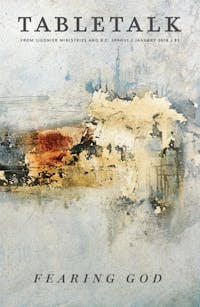
Request your free, three-month trial to Tabletalk magazine. You’ll receive the print issue monthly and gain immediate digital access to decades of archives. This trial is risk-free. No credit card required.
Try Tabletalk NowAlready receive Tabletalk magazine every month?
Verify your email address to gain unlimited access.
In the Scriptures, we are commanded to love God. In the same Scriptures, we are commanded with similar emphasis to fear God. I did not find this difficult to understand. In our home, I was taught to love my father. He was a reserved and quiet man, but even in my teenage years, when it seemed “uncool,” he would hug me and kiss me on the cheek. I knew I was loved, and I responded with love.
In that same home I was taught to fear my father. This was not a morbid terror; it was a fear that reflected a reverential awe. He was beyond me in position. He was my father and I was not his equal in position. I was under his authority and dependent upon his provision. He was beyond me in knowledge and wisdom. He was beyond me in the eyes of the world. In the eyes of the world, I had to have his permission to be engaged in certain activities. In a limited way, he was the first transcendent person in my life.
So, for me, there was no conflict between loving him and fearing him. My reverence of him was evident in every part of our relationship. The way I addressed him, the way I obeyed him, the way I sought his counsel and his will demonstrated a very real respect.
Considering this subject, I have always been fascinated by the scene depicted in Isaiah 6:1–3:
In the year that King Uzziah died I saw the Lord sitting upon a throne, high and lifted up; and the train of his robe filled the temple. Above him stood the seraphim. Each had six wings: with two he covered his face, and with two he covered his feet, and with two he flew. And one called to another and said: “Holy, holy, holy is the Lord of hosts; the whole earth is full of his glory!”
These wonderful creatures, the seraphim, are demonstrating a reverential awe for God. Undoubtedly, they had known Him and been in close proximity to Him for a significant period. Yet, their response to His presence was extreme veneration. The seraphim were sinless. They had no moral shame and no need of repentance. Their knowledge of Him and their closeness to Him did not make Him less transcendent. The seraphim’s fearful worship declared to any observer the transcendence of their God. That sacred scene forces us to ask, do our words and acts of worship declare to any and all observers the transcendence of God?
One of the first times we read of the disciples’ fearing Jesus was when He abruptly stopped the violent storm on the Sea of Galilee. The incarnate Creator commanded His creation, and a great calm replaced the strong winds and raging waves. Was the response of the disciples, “Hooray, we are saved”? Were they giving each other and Jesus high-fives? Mark tells us their exact response: “And they were filled with great fear and said to one another, ‘Who then is this, that even the wind and the sea obey him?’ ” (Mark 4:41). Suddenly, they were more afraid of this man in the boat with them than they were of the storm. They had seen something of His transcendence.
Some would object and say, “Yes, but Jesus died for our sins. He died that we might stand before God knowing that no charge can be brought against us. We have been reborn by the power of the Holy Spirit and now call God ‘Father.’ ” The atoning sacrifice and the new birth are indeed great truths in our salvation. However, neither the cross nor our spiritual rebirth made God less transcendent. Remember the seraphim? They were close to God and without sin, yet they still responded with reverential awe.
The Apostle John had been as close as anyone to Jesus. He walked the roads and hills of Galilee with Him. They had spent long hours together conversing over meals. John was at the cross at Calvary, where Jesus committed to him the care of His mother. Yet, after His return to glory, when He revealed Himself to this faithful Apostle on the island of Patmos, what did John do? John says, “When I saw him, I fell at his feet as though dead” (Rev. 1:17).
There is a tension here. God the Father is our Father through the rebirth. He has told us to address Him as “Father,” a close intimate family title. Jesus is our elder brother. Therefore, there is a genuine closeness to God, a relationship. However, God is also God—glorious, majestic, holy, just, omnipotent, omniscient, eternal, transcendent. We never experience Him apart from those attributes. We have the privilege of addressing Him as Father, and there is the reality of a family relationship, but that relationship does not change the truth that we are creatures and He is the Creator. To be in His throne room with the great seraphim and romp around the throne as loving children is not a familial privilege—it is insolence to the Almighty. You never see that picture in Scripture. In that throne room, love must always be joined with reverence.
We must continually ask ourselves as ministers, officers, and members of His church, what does our worship say about our God to those who observe? Maybe the world’s lack of any fear of God has rubbed off on us more than our fear of God has rubbed off on them.
